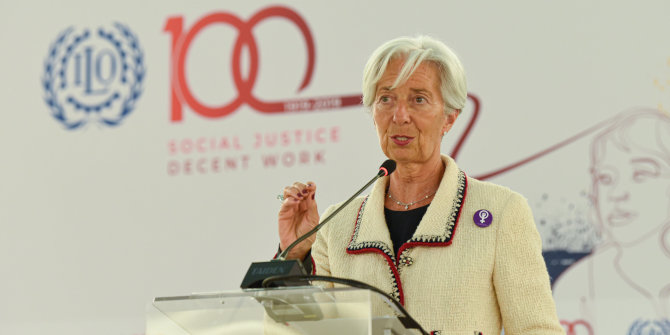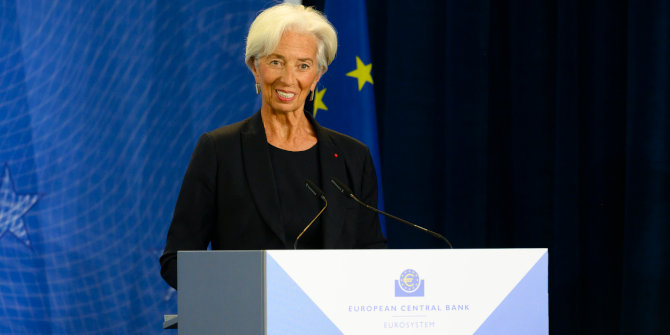
The UK’s decision to leave the EU is expected to have an impact not only on British domestic politics, but on politics across Europe. Aleks Szczerbiak writes that Poland’s government, for whom Brexit means the loss of its main EU ally, blames the crisis on over-reach by the Union’s political elites, while the liberal and centrist opposition has argued that the country needs to re-join the European ‘mainstream’ and re-build its alliance with Germany. Although Poles appear to be taking an increasingly instrumental approach towards the EU, no mainstream political party has questioned continued Polish membership and a post-Brexit upsurge in Euroscepticism appears very unlikely.
The prospect of British withdrawal from the EU means that Poland is losing a key ally on a number of important policy issues. As the largest non-Eurozone EU member, the UK government played a pivotal role in preventing the development of a two-speed Europe with the locus of Union decision making shifting to those states that were part of the single currency area. The prospect of Brexit, therefore, raises concerns that further European integration will hasten the process of building a hard core based on the Eurozone, potentially leaving Poland marginalised on the EU’s periphery. Warsaw also saw the UK as a close ally in developing a tough EU response to Russia, fearing that France and Germany were too inclined to strike up cosy bilateral deals with Moscow that side-lined post-communist states such as Poland.
Moreover, the current Polish government, led since autumn 2015 by the right-wing Law and Justice (PiS) party, has particular reasons for being concerned about Brexit as it will be losing its main supporter among the large EU member states. The Law and Justice government moved away from the strategy pursued by its predecessor, led by the centrist Civic Platform (PO) party, of trying to locate Poland within the so-called ‘European mainstream’ by presenting the country as a ‘model’ European state at the forefront of the EU integration project and prioritising the development of close relations with the main EU powers, especially Germany. Law and Justice, on the other hand, has argued that Poland needs to be more robust and assertive in advancing its national interests, re-calibrating its relationships with the major EU powers and forming its ‘own stream’ that can counter-balance their influence, identifying Britain’s Conservative government as its main strategic partner in this project.
Although Law and Justice supports EU membership, like the British Conservatives it is also an anti-federalist grouping committed to defending Polish sovereignty, and in recent years has articulated an increasingly fundamental and principled critique of further European integration. It is also a member of the European Conservatives and Reformists grouping, the third largest in the European Parliament (EP), 21 of whose 73 members are British Conservatives. This will almost certainly cease to function after Brexit and if this occurs before the end of the current EP’s term in 2019 then its 18 Polish members, mostly from Law and Justice, will have to join another grouping or sit as independents.
British Conservative MEPs defended the Law and Justice government in EP debates on its dispute with the European Commission, which in January launched an investigation into whether Poland had breached the rule of law following domestic political and legal controversies over the membership and functioning of the country’s constitutional tribunal.
It was also expected that the British government would oppose any attempts to introduce sanctions against Poland if the Commission referred the issue to the European Council. So Brexit will leave Law and Justice without its most significant ally in the EU institutions. On the other hand, the Brexit imbroglio will also relieve some of the pressure on Law and Justice as the Commission will now be completely absorbed in trying to deal with the crisis and the EP has already postponed a debate on the state of democracy and human rights in Poland scheduled for its next plenary session in July.
Who is to blame and how should Poland respond?
Law and Justice responded to the Brexit vote by arguing that it was a vindication of its critique of the EU political elite who they say have precipitated mounting Euroscepticism by over-centralising and trying to force their vision of deeper European integration against the popular will. They cited the Commission’s ‘rule of law’ investigation into Poland and plan to impose migrant relocation quotas on member states as examples of such over-reach. Law and Justice called upon the leaders of the EU institutions – notably European Council President Donald Tusk, Law and Justice’s political nemesis who was Poland’s Civic Platform prime minister in 2007-14 – to take political responsibility for the Brexit crisis and resign.

Donald Tusk in Warsaw, 2014. Credits: Mateusz Włodarczyk – www.wlodarczykfoto.pl
Law and Justice also tried to take the political initiative by calling for a fundamental re-think of the trajectory of the European project, highlighting the necessity of the EU undertaking deep reforms if it is to survive. The party called for a new European treaty that returns the EU to its original role as a strong but loose international ‘confederation’ of economically co-operating nation-states based on a more consensual decision-making process and clearly defined division of rights between the Union and its members.
This would involve weakening the European Commission bureaucracy, whose role would be restricted to regulating the single market, shifting more EU decision-making power to the European Council and national governments who would be freer to pursue their own policies, and reducing the dominant role of the Franco-German axis. Interestingly, Law and Justice also called for the EU to become a powerful foreign and defence policy ‘superpower’ with the European Council President, selected for a lengthy term, standing at the head of an EU army that is closely integrated with NATO.
The main opposition parties, Civic Platform and the smaller liberal Modern (Nowoczesna) grouping, on the other hand, blamed Law and Justice for contributing to the growth of the Euroscepticism that led to the Brexit vote through its criticisms of the Commission and the Franco-German axis. They called for the government to return Poland to the ‘European mainstream’ by supporting deeper integration and re-building the country’s previously close alliance with Germany.
They also proposed re-opening the debate on Polish adoption of the euro, so that the country does not become a second tier EU member, but sits at the heart of a Union that they argue will inevitably integrate more closely around its Eurozone hard core. Although it has not ruled out Eurozone accession (which most Poles oppose) in principle, Law and Justice argues that, given the single currency’s huge problems, it cannot envisage any point in the foreseeable future when it would be advantageous for Poland to adopt the euro.
EU membership as a civilisational choice
The only calls for a ‘Polexit’ referendum on whether Poland should leave the EU have so far come from fringe politicians on the radical Eurosceptic right. Law and Justice’s anti-federalism notwithstanding, the dominant view in the ruling party remains that it is in Poland’s interests to remain in the EU and try to reform it from within. Moreover, although Poles are critical of attempts to deepen European integration in a number of areas, notably the migrant relocation scheme, the overwhelming majority of them remain committed to EU membership, unlike in countries like the UK where public Euroscepticism is a powerful political force. Opinion surveys held immediately after the Brexit referendum found support for the EU holding up at around 80% with only 15% against.
A key motivation for Poles voting overwhelmingly to join the EU in the country’s 2003 accession referendum was the idea that it represented a historical and civilisational choice to re-unite with the West and the culmination of the post-communist democratisation process. One of the main reasons why levels of popular support for the country’s EU membership have remained so high is, therefore, that many Poles, especially among the older generations, still see the European integration process as part of a symbolic re-uniting of Poland with a Western international community of shared values that they had always considered themselves to be part of culturally and spiritually.
This is linked to a feeling that Poland’s geo-political situation necessitates membership of Western international organisations such as the EU for security reasons. All of this makes it difficult for Polish Eurosceptics to construct a convincing alternative narrative because EU membership appears to go with the grain of the country’s recent history. This is obviously very different from the context in countries such as Britain where it is perfectly possible to construct a historical narrative that does include the country’s membership of the EU.
This idea of EU membership as a natural and obvious civilisational choice has, however, come under strain in recent years due to an increasing sense of cultural distinctiveness that many Poles feel towards Western Europe. This is particularly evident in the sphere of moral–cultural values where Polish attachment to traditional morality and national identity stands in stark contrast to the socially liberal, cosmopolitan consensus that predominates among West European cultural and political elites.
This issue has surfaced recently in the contrasting reactions of Poles (and other Central Europeans) and West European political elites (although not necessarily their publics) to the European migration crisis. Poles are keen to avoid the kind of cultural and security problems that many of them feel West European countries have experienced through admitting large numbers of Muslim migrants who are seen as difficult to assimilate and embedding violent extremists within their communities.
A more instrumental approach
Moreover, a post-accession younger generation of Poles – who, in contrast to the Brexit referendum trend, appear to be the most Eurosceptic demographic constituency – has developed a less abstract and more instrumental approach to EU membership, with support being driven increasingly by the tangible benefits that it is felt to deliver. Among these are the large fiscal transfers that the country receives, particularly EU regional aid of which Poland is currently the largest beneficiary and which many Polish commentators see as crucial to its economic modernisation. The current EU budget, which runs until 2020, was always likely to be the last from which Poland would benefit so substantially and, given that the UK is one of the largest net contributors, Brexit will almost certainly limit the scale of these fiscal transfers further in the future.
Moreover, although it has led to skill shortages in some sectors of the Polish economy, the ability to be able to travel and work abroad has also been one of the main pillars of support for EU membership in Poland. The UK was one of the few states that gave immediate and relatively un-restricted access to its national labour market to workers from the post-communist states which, like Poland, joined the EU in 2004. As a consequence, Britain has been one of the most popular destinations for Poles seeking work in Western Europe with an estimated 800,000 Polish migrant workers currently living there.
Indeed, concern about uncontrolled mass EU migration was an important driver of support for Brexit and there will almost certainly be restrictions on Poles hoping to access the British labour market in the future. Much of this Polish outward migration could, of course, simply be displaced to other EU countries, although Brexit may also lead to political pressures for these states to also try and limit access to their labour markets.
This, together with a decline in EU fiscal transfers to Poland and the fact that younger Poles in particular appear to have a more instrumental approach towards EU membership, could create the potential for an increase in Polish Euroscepticism at some point in the future. However, these are very much possible long-term trends and in the foreseeable future the prospects of Brexit leading to an upsurge in support for ‘Polexit’ appear extremely unlikely.
Please read our comments policy before commenting.
Note: This article gives the views of the author, and not the position of EUROPP – European Politics and Policy, nor of the London School of Economics.
Shortened URL for this post: http://bit.ly/29kM6pS
_________________________________
 Aleks Szczerbiak – University of Sussex
Aleks Szczerbiak – University of Sussex
Aleks Szczerbiak is Professor of Politics and Contemporary European Studies at the University of Sussex. He is author of Poland Within the European Union? New Awkward Partner or New Heart of Europe? (Routledge, 2012) and blogs regularly about developments on the Polish political scene at http://polishpoliticsblog.wordpress.com/





